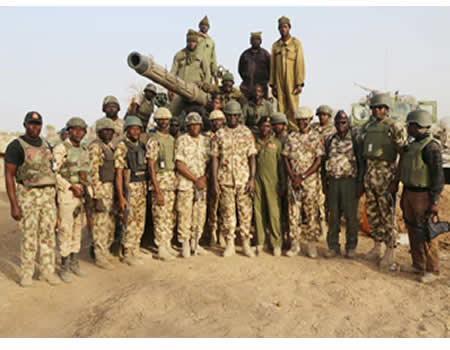EACH time the terrorists get into towns and villages to steal foodstuffs, they sometimes return to Sambisa forest with women and children who are then either trained to fight or used to cultivate their farms. These mishaps may yet be happening due to several factors, some of which are obvious insufficient military and police personnel and intelligence fatigue we have for the task ahead.”
This was how a security operative put the challenge being faced by soldiers battling terrorists in the North East which has made military authorities to design new strategies.
Ten years after the Boko Haram war started in the North East, it would appear that the army under the direction of General Tukur Buratai is evolving a new strategy to speedily draw the curtain on the war. The new targets are the economic interests of the terrorists.
Saturday Tribune investigations reveal that the asymmetric war is now being fought on new fronts, including economic, a situation which has resulted in the turning of the table against the terrorists. Several vehicles loaded with vital economic ingredients belonging to the terrorists have been seized and destroyed this year through the joint effort of the Theatre Commander, Operation LAFIA DOLE, Major General Olusegun Adeniyi, in conjunction with all sector commanders in the theatre.
According to a senior military operative involved in the war, for the sub-economic warfare to succeed, it requires the support of the cyber command and top-class intelligence input from all participants – military and civilian – in the theatre. “It would also depend on the willingness of the entire citizenry in the north-east of the country who consistently patronise the products of the insurgents in the bush markets to desist from doing so and stop making the insurgents wealthier,” he said.
Also, a source within the mobile police unit now posted to Konduga to fight alongside the military said: “The only obvious leakage the theatre has to deal with in all the sectors now is the intermittent stealing of foodstuffs by the insurgents which really empowers them, whether we like it or not. Items the insurgents steal during surprise ambushes include food and non-food items like petroleum products which get into some of these illegal bush markets, some of which are not known to the local government chairmen.”
An expert in intelligence matters who spoke to Saturday Tribune in Maiduguri but begged not to be named stated that the biggest measure so far taken against the bush economy of the insurgents is the border closure by President Muhammadu Buhari. “We in the North East are very happy about the border closure. This is because in spite of the clampdown on the illegal trade in expensive hide, these insurgents still find a way to buy and sell agro-products with their compatriots on the fringes of the vulnerable Lake Chad region. But in my opinion, it has further rubbished the once thriving economy of the Lake Chad now mostly in the hands of terrorists,” said the expert.
It was gathered that every General that had been posted to the command and control center after the directive of the president had come with his own strategy to take the fight to the camp of the enemies based on the guidance of the Chief of Army Staff and the Chief of Defence Staff, General Abayomi Olonisakin, who are said to emphasizing the need for the three arms of the military to perform to the best of their capacities against the insurgents.
“Most of the predecessors of the new theatre commander had targeted the insurgents frontally which is the right thing to do. And this has given residents a breathing space and allowed them sleep with two eyes closed,” said a military source.
General Adeniyi, in an interview with Saturday Tribune, expressed the belief that the obvious loose end of the asymmetric warfare is the economic strength of the insurgents which has bothered his commanders so much and which is why they are now targeting and uprooting anything adding to the financial strength of the enemies.
“Anything that is serving as a catalyst for keeping them on is being brought down in this economic war. This is why we are not happy with some non-governmental agencies fuelling the war and that is the reason we will not spare anyone caught again doing what we have figured out to be underhand businesses,” said Adeniyi.
General Adeniyi posited that with the closure of the official borders of the nation, the financial strength of the terrorists is being curtailed and terrorism might become history very soon. The General alleged that some humanitarian agencies have been conniving with the insurgents through the provision of supplies to them. He said this discovery was made by his soldiers during some sensitive operations in the course of the year.
Saturday Tribune investigations showed that most of the field commanders on the ground and in the air are worried about the proliferation of illegal markets in the bushes, especially in northern Borno and how they have been supporting the insurgents. A source within the military said there were about 30 of such illegal markets in northern Borno alone where locals interact directly with the insurgents in terms of trade. According to the security source, most of the markets are hidden and unknown to civil authorities.
“We are aware of about 30 of such markets in northern Borno alone and most of them are found around the fringes of the Lake Chad region. Most times, we are constrained to act, especially when the criminal elements embed themselves in-between women and children and who are mostly innocent civilians. These markets function daily while others do on specific days. With surveillance, you will surely see the criminal elements coming to buy or sell in such markets. I tell you that strange things happen in northern Borno. Can you imagine that there is one market that opens at about 5.00 p.m. and closes by 10.00 p.m.? That is how strange some of them are and we shall surely get to the basis of their existence and stop any illegal trading with the criminals,” the source said.
General Adeniyi told Saturday Tribune that the insurgents are desperate to boost their economy which is why they are seen in almost every bush and sometimes metro market getting involved in commercial activities.
“Recently, troops of the Nigerian Army raided one such market at the Magumeri/Mongunu axis and a lot of insurgents were spotted in the area but because of the high infiltration of the market by the insurgents, we had to lie low and wait for the right time to strike without collateral damage,” the theatre commander said.
Most of the markets, according to sources, are patronised by people from the liberated areas and some foreigners in neighbouring Chad, Niger and Cameroon, some of whom are supporters of the insurgents. While some who trade in cattle come from Maiduguri to buy rustled cows from the insurgents, others, the sources said, come from Monguno, Bougadouna, Gargariram, Tam, Abari, Afofo, Diffa, Arikaluwo, Gueskeiou, mostly in Niger Republic. According to intelligence sources, yet others come from Mallam Fatori, Kayari, Girle Kura, Mboko, Kumagu and many other remote communities in the Lake Chad region. Security sources further claim that over 400 cattle have been rustled so far in the theatre in the last one year, some of which the new General Officer Commanding, 7 Division, Brigadier General Abdul Kalifa, has brought to the attention of the public through press conferences.
“Those along the Chadian borders engage mostly in fishing. A few foreign or non-criminal elements that are also desperate to fish are allowed to fish on one condition: if they are ready to pay tax to the criminals. So, they have a lot of sources for their resources and we are talking about millions of naira which they launder through these bush markets in the region. Within the last couple of months, about 15 vehicles laden with motorcycle spare parts, kegs of palm oil, engine oil, petrol and many other items for the survival of the women and children the criminals are keeping in their harems in the bush were seized.
“We have clear evidence that the criminal elements are still rustling cattle. They now know we have set lots of traps for them in Maiduguri and that people are afraid to buy such rustled animals because they will be fished out. So, they go to Yobe and surrounding villages and bush markets around that axis to sell. I am talking about Marte, Zaga, new Marte Darolara, Kandillam and others in neighbouring Chad like Foliwa, Alagarno and Shiwari. They make millions from such rustled animals. Some of them have made so much money from these illegal trades that they sneak into the surrounding countries, find their way even to the holy land and return unnoticed. If an insurgent commander can become so rich with the support of their West African comrades of ISIS and can go to Mecca unnoticed through our borders and come back, then you should know that an enormous amount of money is being laundered by these people,” the source posited.
There are also allegations that international organisations and non-governmental organisations (NGOs) are supporting insurgents. UNICEF and Mercy Corps were so accused.
It was gathered that high-level negotiations led by a former governor of Borno State, Kashim Shettima and some top political figures in Abuja led to the reversal of a closure order against UNICEF. It was learnt that it resumed operations but it is doing very little now as it has started closing most of its field offices. The same thing is said of Mercy Corps and the Action Against Hunger which were equally closed and were later allowed to reopen after some high-level diplomatic negotiations.
A source at Mercy Corps who spoke to Saturday Tribune anonymously denied that the organisation was helping insurgents.
“We do not doubt that the military must have seen our items in the camp of the insurgents. But that does not mean we gave it to them. We have consciences and some of us have seen deadlier wars in serving humanity and we would not do that at all. They may have seen those items they are emphasising on because a couple of our storage facilities were attacked and looted by the insurgents during that period. We don’t have weapons to protect these stores and there was nothing our staff could do about it other than to run for their lives.
“We feed a lot of people in northern Borno, especially in the Monguno council area. As a matter of fact, over 300,000 people benefit from our services in Borno and Yobe alone. That was why there was massive jubilation in the camps when the president directed that they allowed us to go back to serve humanity,” the source said.






